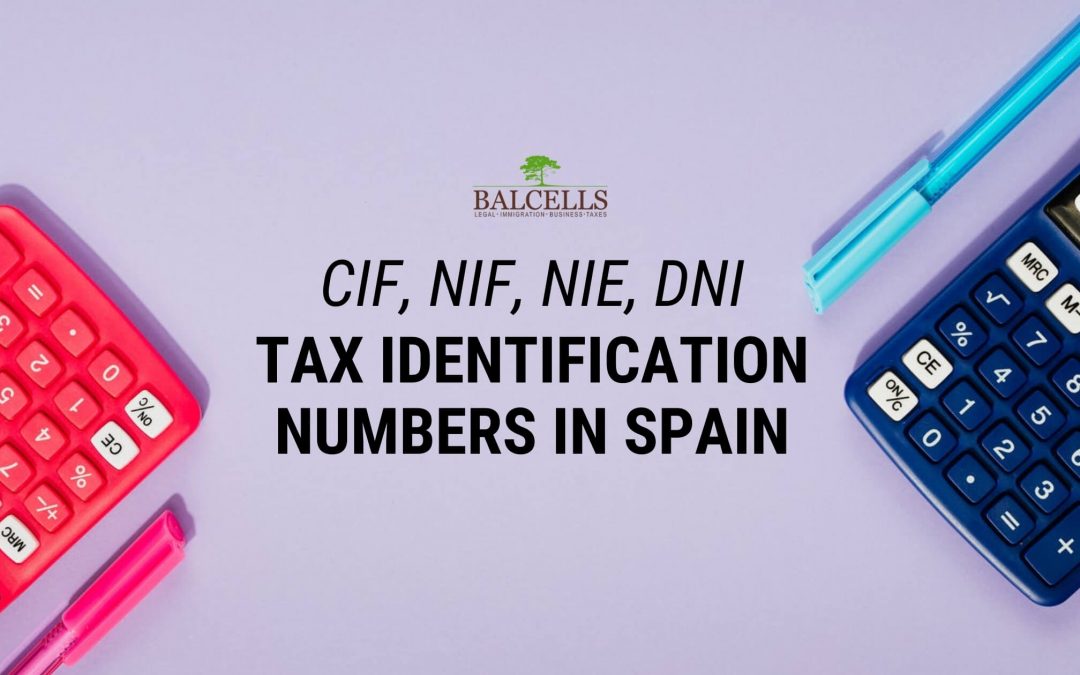If you are going to live in Spain or carry out any kind of legal or financial procedure, you will need a tax identification number. Depending on your situation, that tax ID can be called NIF or CIF, which at the same time can be equal to your NIE or DNI. But enough terminology. Let’s dive deep into the article and fully understand when exactly will you need your tax ID, how to get it, and what exactly is the difference between CIF and a NIF.
Who needs a tax identification number in Spain?
No matter your situation, if you participate in any type of economic or financial activity in Spain, you will need to request a tax identification number.
This number is the specific ID that will identify you against the Spanish Tax Agency and allow this institution to control and monitor all the operations that have or do not have tax payments associated.
That is why it is so important to request one, and if you don’t, you won’t be able to carry out many specific procedures.
We are talking about legal proceedings such as setting up your company in Spain, becoming a self-employed worker, invoicing, or purchasing a house in the country. Nevertheless, this ID is also used for other legal procedures like obtaining your driving license.
In that sense, we must make an important distinction, which we will explore in greater detail in the following sections.
If you are a foreigner resident in Spain, your NIE will in many cases work as your tax ID number too (even though the NIE is basically your general ID number to be identified for any kind of procedure in general).
Spanish nationals have their basic ID, called DNI (documento nacional de identidad), which works as a NIF (tax id for individuals).
But if they set up a company, then they will need to request an extra identification number that is called CIF.
What is a CIF number in Spain?
The CIF is the tax ID number that identifies a company or legal entity in Spain. Hence, if you are to set up a company in the Spanish territory, you will need to request this extra number, as your personal tax identification is not enough.
This CIF is made up of a letter plus eight digits, totaling 9 alphanumeric digits:
- The first digit indicates the type of organization or business structure (for example, A for stock corporations, or B for limited liability company). Each type of company has its own letter.
- The next two digits correspond to the geographical region the company is located in. In the case of Barcelona that number is 58, and 28 for Madrid.
- Next is a unique 5 digit number.
- Finally, a control digit, which can be numerical or a letter. It is calculated with the prior characters.
Bear in mind that this CIF also stands for the VAT number (not like in many other countries in which both are separated and different).
Finally, it is also important to note that the CIF number, even though many still refer to it, does not legally exist since 2008, as it merged with the NIF. This does not mean, of course, that the procedure and requirements will differ depending on whether you are a company or an individual.
Requirements to get a CIF
In order to get your CIF, you will basically need to submit:
- A written NIF application (which must be signed by the company’s representative).
- ID card of that representative
- Certificate of good standing, which must include all the business details (legal name of the company, legal address, nationality, registration date, legal funds, representatives, etc.)
How to know the CIF of a company
If you want to know the CIF of any company, it’s quite straightforward.
You simply need to enter this link, type the name the company, click on search, and you will instantly find its corresponding CIF.
And what is the NIF?
It is highly probable that you don’t need to request a CIF.
In fact, if you are going to carry out any kind of financial or legal procedure personally, you just need your NIF.
The NIF is equal to your Spanish ID number, which can have two different forms:
- If you are a Spanish national, it is called DNI. Then it will made up of 8 letters and a number.
- But if you are a foreigner, your NIF will be the same as your NIE, made up of 8 numbers and a letter (which can only be X,Y, or Z).
Both of these two numbers are issued by the Interior Ministry in Spain.
Requirements to get a NIF
You will need to submit the 3 following documents:
- Identification document, like your passport or ID similar to the Spanish DNI
- Power of attorney if you are applying through a representative (this is the case for those foreigners who are not in Spain and can’ or don’t want to travel to the country)
- Residency proof to verify the consular jurisdiction that corresponds to your particular case
Differences between the NIF and the DNI
Whereas the DNI is the document that identifies Spanish citizens in general for any kind of legal activity, the NIF is required for those operations that have a tax or customs implication.
In that sense, if the authorities need to identify yourself generally speaking, if you need to sign any document or you must travel abroad, then the DNI (as a Spanish national, if you are a foreigner the NIE) will be the ID requested.
But if the procedure you are carrying out has a financial nature and is related to your personal taxes, then you will use the NIF.
Where can I get my tax identification number in Spain?
Depending on the particular situation, the number will be obtained in one place or the other.
First of all, if you are a Spanish national, you already have your DNI or if you have just obtained citizenship, you will obtain this basic ID for Spaniards at the closest police station (you will need an appointment for that).
On the other hand, if you are just a resident, then the NIE will work as your NIF, as we mentioned before. In our complete guide to obtaining your NIE, we explained how to get it step by step, but you have two different options:
- Get one directly in Spain, at the immigration office
- At the Spanish consulate or embassy if you are still in your country of origin. This is usually the case for non-residents who have a property in the Spanish territory, or for those applying for their residency card (the NIE comes along with your visa).
Nevertheless, as obtaining an NIE is becoming a harder task every year, the government has created an exception for those who really need their NIF. There are certain situation in which you can directly apply for your NIF at the Spanish tax agency (without requesting your NIE at the Ministry of Interior), even though that NIF will be temporary:
- If you are a Spanish national under 14.
- If you are a Spanish citizen who has her residency abroad and no valid DNI.
- If you are a foreigner who is not allowed to apply for an NIE number.
- If you are a Spanish company (in this case the tax ID will be permanent)
Hence, as you can see in the latter case, if you are to set up a company, you will need to get your CIF, and that must be done at the provincial AEAT.
Request legal assistance with your tax numbers
Now you already know the main differences between the NIF, CIF, NIE, and DNI. But perhaps you still have some doubts, our need legal assistance to apply for any of them.
If that is the case, you just need to book an appointment so one of our lawyers can get in touch.
We will guide you step by step and manage the whole procedure so you don’t need to worry about anything.
Book a consultation with one of our lawyers and solve all your doubts:



